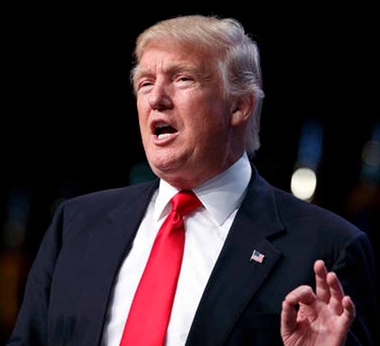Trump to unveil new child care affordability policies

Des Moines, Iowa (AP) — Donald Trump is rolling out proposals Tuesday to make child care more affordable for working families, including a plan to guarantee new mothers six weeks of paid maternity leave and create new dependent-care savings accounts.
Trump will unveil the plans in a speech in a Philadelphia suburb, a key area in a vital swing state as Trump tries to build his appeal with more moderate, independent voters — especially women. Child care is one of the biggest expenses many American families face, surpassing the cost of college and even housing in many states.
The Republican presidential nominee, breaking with some conservative orthodoxy, would guarantee six weeks of paid maternity leave to employees whose firms don't offer leave already. The campaign says it would be provided through existing unemployment insurance.
The leave program would not apply to working fathers. Trump's Democratic opponent, Hillary Clinton, has called for 12 weeks parental leave for both mothers and fathers paid for by taxes on the wealthy.
Trump in August had proposed reducing child care costs by allowing parents to fully deduct the average cost of child care from their taxes. He is expected to flesh out that plan Tuesday, including expanding the deduction to include costs associated with caring for elderly dependent relatives.
But as a tax deduction, rather than a tax credit, critics say the plan would primarily help more affluent households. More than 40 percent of U.S. taxpayers don't make enough money to owe taxes to the federal government, meaning they would not benefit from a deduction.
The deduction would apply only to individuals earning $250,000 or less, or $500,000 or less if filing jointly. Lower-income earners would receive child-care spending rebates through the existing Earned Income Tax Credit.
Trump will also lay out plans to create new "Dependent Care Savings Accounts" that would allow families to set aside money to look after children or elderly parents. The accounts would allow both tax-deductible contributions and tax-free appreciation year-to-year, according to the campaign. It could be used to pay for child care, after-school programs and school tuition. To help lower-income parents, the government would match half of the first $1,000 deposited per year.
For elderly dependents, the accounts could be used to help pay for services including in-home nursing and long-term care.
Trump is also expected to propose incentives for employers to provide child-care options at work. He has previously touted similar programs at his hotels and golf clubs — but The Associated Press has reported that those options are offered to guests and club members, not employees.
Trump aides did not address how much the proposals would cost, but stressed that, when combined with other policies including Trump's tax plan, it would be cost neutral. Trump is expected to elaborate on his tax plan in a speech this week.
Clinton, meanwhile, proposes that no family should spend more than 10 percent of its income on child care.
To achieve this goal, Clinton would seek to boost federal spending on child-care subsidies and provide "tax relief for the cost of child care to working families." Those benefits would be offered on a sliding scale based on need.
Since announcing the plan in May, Clinton has offered few details, including how it would be funded beyond raising taxes on wealthy Americans.
At his Tuesday speech, Trump will be introduced by his daughter Ivanka, arguably his most effective female surrogate, who surprised many at the Republican National Convention when she used her address to declare that her father's administration would "focus on making quality child care affordable and accessible for all." That was the campaign's first significant mention of the topic.
The rollout comes as Trump furiously tried to make inroads with moderate, often suburban, women, who have been reluctant to support a candidate who has made many derogatory remarks toward females. And it is part of the campaign's hope to swing Pennsylvania, which has voted Democrat in event election since 1992.
By Jonathan Lemire and Jill Colvin, Associated Press. Copyright 2016 The Associated Press. All rights reserved. This material may not be published, broadcast, rewritten or redistributed.
The Gayly – September 13, 2016 @ 10:50 a.m.





